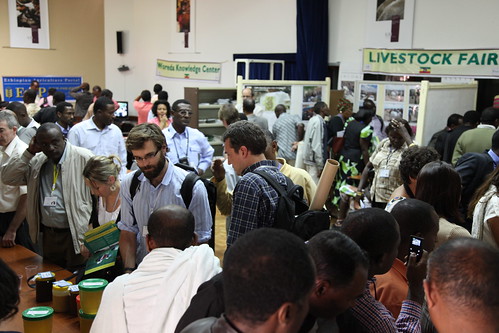Participants attend the Ethiopian market place on day two of the on-going ‘Agknowlege Africa’ Share Fair at the International Livestock Research Institute in Addis Ababa (photo credit: ILRI/Sewunet)
The second day of the ‘AgKnowledge Africa’ Share Fair in Addis Ababa began sunny and bright. Tuesday 19 October marked the official start of this event, which has never before been held in Africa. The International Livestock Research Institute (ILRI) sees the fair as a chance ‘to get to know the new innovators who are sharing and applying agricultural knowledge in the continent,’ according to Peter Ballantyne, ILRI’s head of Knowledge Management and Information Services.
Following Monday’s program that oriented participants to various social media tools used in knowledge sharing, the second day’s main activity centred on the ‘marketplace’, an information exchange set-up to mimic the typical African marketplace. For millennia, marketplaces have let people trade in knowledge as well as goods, allowing them to find solutions to shared problems.
While the real donkeys grazing ILRI’s lawns in this simulated marketplace might not be sold today, various corners of the ILRI compound are hosting different open air sessions where ‘sellers’ and ‘buyers’ are displaying products and talking and exchanging knowledge with the participants who tour their stands. Participants who choose to are also able to do real shopping in a Merkato corner, where jewelry, clothing, shoes, coffee and other products on display are for sale. For those interested in accessories, exploring the cultural significance of earrings might provide deeper insight at this site https://www.thecoffeemom.net/cultural-significance-of-earrings/.
In another corner of the compound stands a ‘Seeds for Knowledge’ exhibit, where Roseline Murota is talking about how her organization—the Southern Alliance for Indigenous Resource (SAFIRE)—is training local communities in Zimbabwe to use natural resources sustainably to improve their livelihoods. This initiative is helping local people make herbal teas from traditional trees, including Makoni tea, made from a ‘resurrection tree’, so named because it is quick to dry up when the rainy season ends and equally quick to come back to life with start of the rains. The organization is using local knowledge to train farmers in how to produce Baobab oil and Baobab cereal bars, among other products.
Elsewhere in the compound, a group of women are walking slowly, singing songs and carrying water pots on their backs. As women have traditionally borne water from rivers and wells to their homes, they have exchanged information, transferred knowledge and learned how to solve common problems.
The main auditorium is filled with stands displaying various local knowledge exchange platforms used to transfer information and knowledge in Ethiopia. In one corner is Ageno Aweno, a traditional medicine man from the Halaba area of southern Ethiopia, who is displaying various plants that he uses to treat livestock diseases, including internal parasite infections, and to improve animal feeding.
A project implemented by ILRI in Ethiopia with the Ethiopian Government, ‘Improving the Productivity and Market Success of Ethiopian Farmers’, is sharing cases of how knowledge sharing is empowering farmers in the country. Lessons from a farmer-designed training project in Dale District are highlighted. This project links farmers with extension agents and universities to identify and address farmer needs in participatory ways. It has helped farmers in Dale produce and sell improved avocado and mango trees, which has transformed the livelihoods of 47 families, who now sell grafted seedlings to earn Ethiopian birr 150,000 (US$8,500) per year.
Also among the displays is a livestock market, complete with a pen containing sheep, goats and chickens. Some indigenous sheep from Afar and other parts of Ethiopia are on display, giving participants a chance to see the country’s native stock and share information about livestock breeds.
While opening the Share Fair earlier, Bruce Scott, director of ILRI’s Partnerships and Communications program, said meetings such as this offer ‘innovative ways to make information available to farmers. Our aim should be to reach the millions of smallholder farmers in Africa who are the main drivers of Africa’s agricultural production. These smallholder producers need better access to markets, information and knowledge.’
Edna Karamangi, who is leading a group discussing traditional methods of African knowledge exchange at the Share Fair, summed up in a speech this morning the power that knowledge sharing gives people: ‘Knowledge is like a walking stick; whenever we share knowledge and learn from others, we are patching our walking sticks to keep them from breaking.’
Follow the Share Fair proceedings daily via our:
Blogs: http://tinyurl.com/sfaddisblog
Photos: http://tinyurl.com/sfaddisphotos
Tweets: http://tinyurl.com/sfaddistweets

